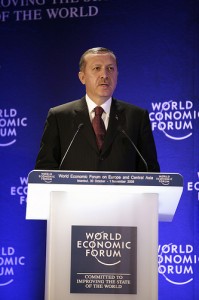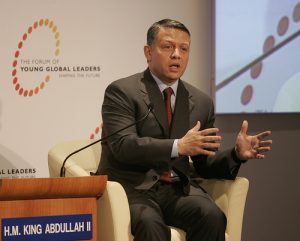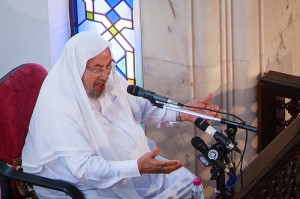A royal institute in the Middle East has come out with its latest version of the 500 most influential muslims of the world. Here is our critique of why this list may be unsound.
Influence is a complicated thing to measure. Regardless, there are no shortage of lists ranking people in terms of importance or influence. While these efforts can be useful exercises in contemplating the dynamics of influence and power, they are most constructive when the organization or people formulating the list have some sort of objective credibility with respect to analyzing and categorizing highlighted individuals.
By this measure, the Muslim 500, an annual ranking of the 500 most influential Muslims in the world, falls well short of being constructive. Organized by the Royal Islamic Strategic Studies Centre (RISSC), a Jordanian think-tank with ties to the country’s royal establishment, the Muslim 500 represents a not-so-subtle defense of monarchical rule in the Muslim world at a time when Muslims globally are agitating for change.
It is not so much the list of names in the Muslim 500 that is problematic. Rather, our concern is how religion is employed to justify and promote the concentration of power in the hands of the elite while disparaging demands for greater accountability rising from people across the Muslim world. The prominence of royal influence throughout the publication is underscored by a tacit religious-political nexus where monarchy and faith seem to go hand in hand. Scholars who legitimate royal privilege and the status quo seem to be lauded, while those who don’t are not. The irony here is that historically, religious authority in traditional Islam often found its authenticity in the rejection of political power, the refusal to rubber-stamp policies of the powerful in exchange for privilege and access. It seems that the report not only embraces the subservience of scholarship to political dynasty, but also actively uses theology as a way of bludgeoning the faithful into accepting monarchical rule and legitimizing the current hierarchical structures of power in the Muslim world.
That monarchy was a form of political orientation in the Muslim world for many centuries is not in dispute. The editors were correct in stating that “it was dynasty not state that defined political authority in the Muslim world.” Monarchy was no less the rule of choice in Europe and across the world until modern nation-states were formed. The editors of  the Muslim 500 imply that monarchy is as applicable today as it was hundreds of years ago and that Islam is intrinsically tethered to rule by royal decree. This preference for vesting power in a king is justified through some sort of theological jujitsu and comes to the astonishing conclusion that it is monarchy, not representative government, that holds the promise for justice in the modern world. The claim is as preposterous as it sounds, and when we consider the dynamics of globalization, modern political economies and the need for responsive governance to promote economic growth and lift people out of poverty, the argument rings particularly hollow.
the Muslim 500 imply that monarchy is as applicable today as it was hundreds of years ago and that Islam is intrinsically tethered to rule by royal decree. This preference for vesting power in a king is justified through some sort of theological jujitsu and comes to the astonishing conclusion that it is monarchy, not representative government, that holds the promise for justice in the modern world. The claim is as preposterous as it sounds, and when we consider the dynamics of globalization, modern political economies and the need for responsive governance to promote economic growth and lift people out of poverty, the argument rings particularly hollow.
It is worth noting that this magazine recognizes that liberal democracy, as it is codified in the various democracies of Europe and North America, may not be the only form of representative government toward which the Muslim world can aspire. We also recognize concerns rising from a nation-state system. However, we do think Muslims can do better than a system of governance that privileges the status of lineage and behind-closed-doors practice of succession.
To be fair to the publication, outside of its penchant for glorifying kings, the list of 500 names, particularly the ones not ranked in the top 50, could very well be a good resource for those trying to understand influential thinkers, writers, activists and scholars around the Muslim world. In addition the publication also includes a comprehensive and useful overview of Islam and the major doctrinal and ideological divisions that comprise the global Muslim population. Nonetheless, the overwhelming thesis of the list remains highly problematic.
The introduction to the Muslim 500 quotes Ghazi Bin Muhammad who “monarchy was thought of as the best – and perhaps only conceivable – form of government because it can best deliver justice and adherence to God’s law.” The argument conflates what may have made sense in the past with the realities of politics and governance today. Who exactly believes that monarchy is best suited to deliver justice today is not made clear, although one would expect a publication patronized by royal affiliation would make such an argument. . Most of the monarchs lauded in the report lead countries that rank in the bottom half of the world on the Human Development Index, a comparative measure of life expectancy, literacy, education and standards of living for countries worldwide. The only exception, Saudi Arabia, boosted its development indicators through oil wealth, not good governance.
It should be obvious why all military, economic and political power should not reside in the hands of a small ruling elite composed of royals and unelected figures. While these reasons are more than self evident, we nonetheless consider it worthy to examine a few of them more closely.
THE WORLD, AND TECHNOLOGY, HAS CHANGED
In the age of empires and caliphates, the centralization of authority in the hands of a single individual was not nearly as problematic for the average person as it is today. If an Ottoman or Abbasid caliph was corrupt, ineffectual or ruthless, his ability to abuse the vast majority of people living under his empire was limited.
In the modern world, a monarch, or any political authority vested with absolute power, can inflict untold levels of violence and disruption on large segments of the population at any time. Technology allows for massive damage, both from a military and a socio-economic perspective. For example, cell phone service can be unilaterally shut down to prevent organization and communication. Centralized municipal authorities can cut off electricity and water. Entire populations of people can be held hostage to the whims of all-powerful rulers. Advances in technology facilitate the concentration of military and economic power in the hands of fewer people who are now increasingly capable of visiting more destruction on more people than at any time in history. The use or abuse of this power without accountability, or systematic checks and balances, is a recipe for disaster, the likes of which we are witnessing in parts of the Middle East.
MONARCHS INVARIABLY CREATE MORIBUND ECONOMIES THAT CAPTURE WEALTH FOR THE ELITE
When a ruling family has all the power, it is invariably the case that nepotism and cronyism become entrenched in the economy. Construction contracts, government purchasing, national licenses and other business interests are invariably influenced by kinship to the king and his royal family. This kind of corruption suppresses innovation and encourages economic stagnation. The key driver of economic growth – entrepreneurship – is stifled because commercial success relies more on relationships than making good products or services. Competition in the marketplace dries up when market barriers are based on relationships, not quality of services or products. When there is no competition, consumers end up suffering the most. Vested interests within the royal family exploit their wealth and privilege to capture value from the economy for themselves at the expense of citizens, who are left to suffer the consequences of poor energy infrastructure, poor roads, an uncompetitive private sector and bad civil services. In the global age where tariffs, treaties and robust legal systems are necessary infrastructure for a vibrant economy, their abuse at the hands of a monarch can have devastating effects for everyone under their rule. While corruption is not unique to monarchies, vesting power in a royal family certainly facilitates it.
Along these lines, perhaps the most obvious argument against monarchy is Turkey – a Muslim majority nation led by a practicing Muslim prime minister in Tayyip Erdogan – which has demonstrated how investing in the Muslim middle class (as opposed to the royal elite) can reap tremendous dividends for the Muslim world. In less than a generation, Turkey has launched itself from a stagnant economy drowning in inflation to one of the most dynamic economies in Europe and the Middle East. Unlike the monarchs of the Muslim world, Erdogan’s credibility and popularity are directly tied to his ability to deliver increased prosperity to his people. If he falls short of this, he will be removed from power. This is not the case for monarchies. They are rewarded with power regardless of their competence. In fact, the dynastic monarchy rewards a significant level of incompetence because there is no penalty for failure – they remain in power regardless of their effectiveness at ruling. The monarchy is only in danger when its incompetence reaches such extreme levels as to provoke rebellion. In this regard, the best argument for monarchy is that it is in the royal family’s best interest to avoid complete state failure. We think Muslims can do better.
MONARCHIES SEEK PATRONAGE AND LACK ACCOUNTABILITY
Monarchies tend to seek foreign patrons to aid their regimes and ensure their power. This is certainly the case for a country such as Jordan, where the economy relies heavily on foreign aid. Reliance on foreign revenue to sustain the economy reduces the responsiveness of the monarch to the needs of his people by incentivizing him to seek the favor of his foreign patron. Monarchies are also more easily controlled by foreign states who that need not worry about patronizing a leader that may be removed through election. In fact, foreign states seeking control over a country would much prefer to invest in stable monarchs who can unilaterally enforce policies in exchange for patronage as opposed to elected leaders who fear backlash from opposition groups.
It is worth mentioning that Jordan’s reliance on U.S. aid has a significant impact on its official relationship with Israel, despite the fact that almost half its population is Palestinian. Despite the fact that King Abdullah ranks number 4 on the list of influence, his continued role as king is inextricably linked to U.S./Israeli interests.
Larger monarchies such as Saudi Arabia also depend on foreign support. The Saudi monarchy almost entirely outsourced its national defense to the United States in the wake of the first Gulf War, permitting the U.S. to establish numerous military bases on Saudi soil. The presence of American troops in the Arabian peninsula was one of the stated reasons for Osama bin Laden’s establishment of al-Qaida. It may be worth considering whether al-Qaida would even exist if the Saudi monarchy were more independent from its foreign benefactors and more accountable to its own people.
The introduction quotes Ghazi Bin Muhammad addressing the issue of accountability for monarchs by arguing that participative consultation of “experts, the learned and wise” is incumbent upon the monarch. There are two problems with this approach. First, it assumes that people require experts and learned people to understand their own interests. Having seen events unfold in Egypt, Tunisia and across the Arab world, it’s difficult to argue that people do not understand their own interests. Second, it assumes that experts are representing the best interests of the people. In reality, when there is no possibility for an opposition to replace the king, there is no incentive for experts to oppose his perspective in any meaningful way. The system breeds a cadre of sycophantic advisers whose self-interest is based on currying favor with those in power, not opposing them. Robust debate requires the possibility of governance changing hands, something impossible with the monarchic system. A procedural requirement for consultation when the consulted largely benefit from the largesse of the ruling regime is hardly a check or balance against the king’s power.
It should come as no surprise that four of the five monarchs highlighted as most influential in the Muslim 500 preside over countries ranked in the bottom half of Transparency International’s annual corruption survey (Saudi Arabia, Morocco, Jordan and Oman).
RELIGION AND POLITICS SHOULD NOT MIX
Perhaps the most problematic aspect of the Muslim 500 is its effort to authenticate scholarship in subservience to political authority. Its profile of three highly influential scholars is evidence of this. In the profile of Ali Gomaa, the mufti of Egypt who comes in at No. 12, the editors consider his influence vis-à-vis the Arab Spring to have increased because he was “one of the few figures who held to traditional Islamic Law despite the vogue of the Arab Spring and the oppression of people.” The profile then quotes Gomaa, without context, asserting that “going against legitimacy is unlawful in Islamic Law (Haram). This is an invitation for chaos. We support stability.”
This analysis is contrasted with No. 13, Yusuf al-Qaradawi, a scholar of Egyptian descent whose influence was apparently negatively affected by the Arab Spring because he was “a vocal supporter of all the Arab protests with the exception of the protests in Bahrain.”
No. 20 on the list, Sheikh Said al-Buti – a Syrian scholar who “denounced the protests and called on the protesters not to be driven by anonymous calls to incite sedition and chaos in Syria” – lost a significant number of students after his vocal condemnation of the Arab Spring. However, according to the Muslim 500, his influence was not affected by events around the Middle East.
Is it then true that the only good scholar is the one who defends power in the face of people demanding their rights?
Our analysis considers that the report is articulating a dangerous line of thought that exists today within traditional Islamic scholarship. The Arab Spring demonstrated that Muslim scholars are not as independent- thinking as most Muslims would hope. In this case, the report is not only celebrating scholarship that entrenches the status quo in the face of popular uprising, but also criticizes those scholars who dare side with the people. This institute, and other scholarly institutes that promote this line of thought, are at risk of losing a generation of youth for whom their theological justifications for authoritarian rule ring hollow. It is also creating the context for actual extremists to garner attention among younger Muslim populations for the mere fact that they stand up to persecution, both foreign and domestic. Muslims, especially the youth, desperately seek in their faith the justification and promise of change. Instead, the approach of the institute employs religion as a bludgeon between their faith and their hopes and dreams. The Muslim 500 list imposes readers to believe that we should leave our collective futures at the feet of royal families and hope that this time, they will act in our interests, and not their own.
LEADERSHIP IS NOT INHERITED, IT IS EARNED
The Muslim world is in dire need of leadership based on qualification, not accident of birth. This magazine recognizes that many of the problems associated with monarchies are not necessarily specific to monarchies. Pakistan is a perfect example of a procedural democracy with many of the same problems associated with the concentration of power in the hands of the ruling elite. In fact, the United States itself is undergoing a dramatic transformation in the distribution of wealth that has resulted in king-like behavior. However, the solution to this problem is not less accountability, it is in creating a system where the powerful are held in check by opposing forces. Monarchs, like presidents, must be disciplined. Effective politics is the art of applying discipline to politicians that result in greater prosperity for the people being governed.
The Arab Spring has galvanized Muslim youth by positing in them the possibility of a different future, one in which their voice has meaning. If Islamic scholarship wants to be relevant in this new world, it must begin to divest itself of these ossified modes of patronage based on a bygone era. We need fearless scholarship that stands up to the internal and external forces struggling to maintain a status quo that benefits the few over the many. RISSC has articulated a worldview of traditional Islam that commands the faithful to obey a set of rulers who have demonstrated time and again that the survival of their royal families and the preservation of their power is far more important than the prosperity of their people. This magazine challenges a new generation of scholars to reject this proposition and create authentic Islamic scholarship that allows Muslim youth to take pride in the reality that if their Prophet (peace be upon him) were alive today, he would invariably have pitched a tent in Tahrir Square.
(This article was first published as a critique of the 500 list last year. The criticism remains the same.)
Featured image courtesy of Lestat (Jan Mehlich)/Wikicommons.








